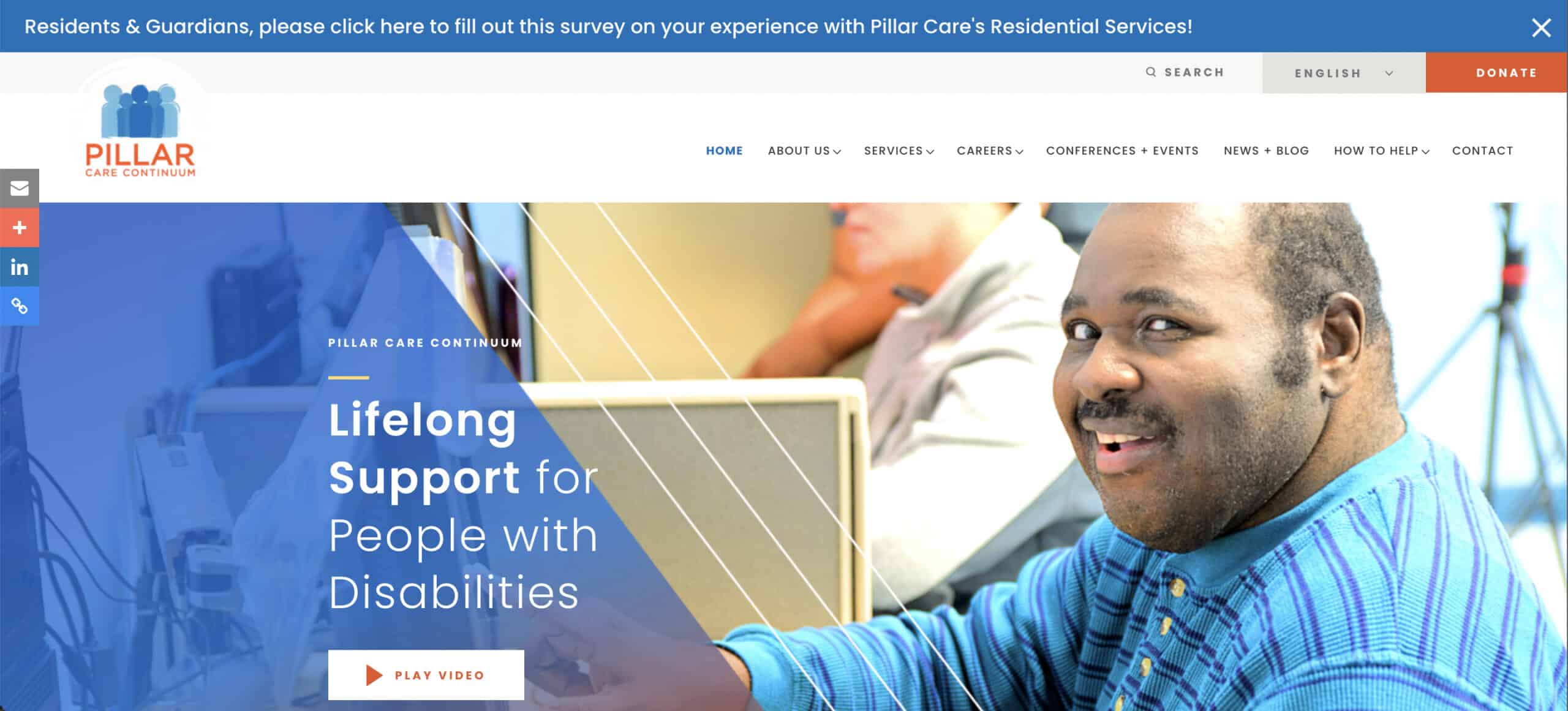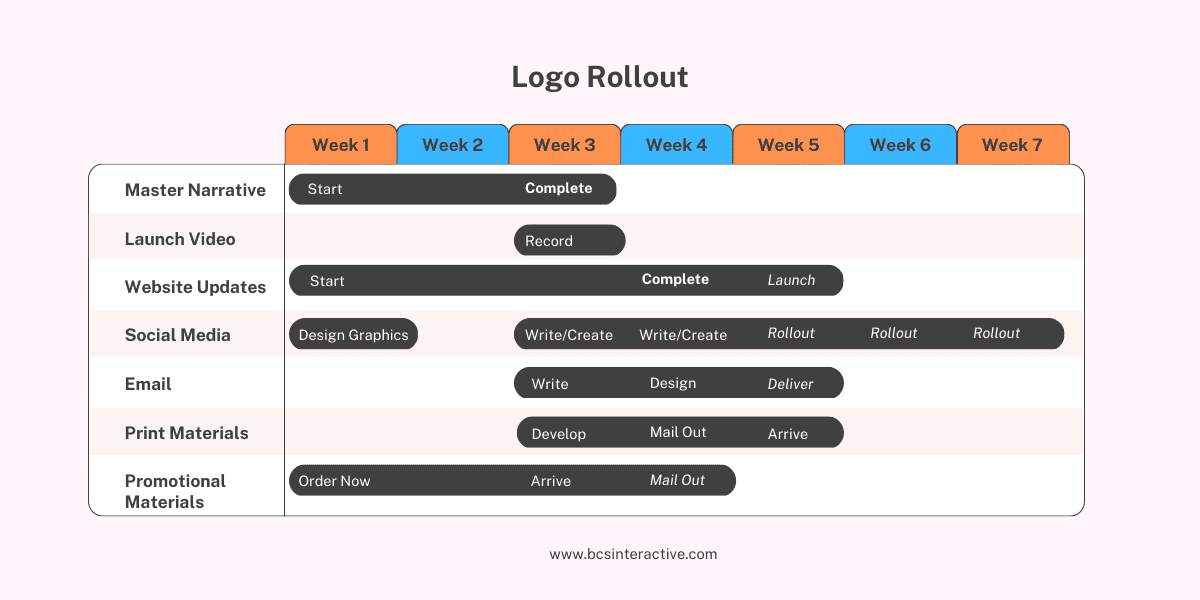March 15, 2023
How to Roll Out a New Logo
Got a new logo? Nice. Here’s how to introduce it to the world.
We get asked a lot about how causes should roll out their new logo. It’s a great question. They’ve put in a lot of work and diligence into reinvigorating their brand – it only makes sense that the right audiences should not only hear about it, but embrace the new direction. But where to start? We live in a digital world, but can’t neglect off-line channels. So, while each organization is different, we recommend a core set of principles that ensures a solid foundation for the logo rollout, and allows flexibility to adapt to specific needs. Here they are:
(Sidenote: Although they’re not entirely the same thing, for simplicity’s sake I refer to the terms “logo” and “brand” interchangeably in this post.)

1. First, Start With Why
Yes, I stole that phrase from Simon Sinek, but it’s the perfect summation for step 1. That is, before diving into how you’re going to introduce your new brand to the world, you’ll need to define why you’re doing it. What are you trying to achieve with the rollout? At first, this may seem self-evident (“Well, we want everyone to see our new logo!”) But of course, there’s more to it than that, isn’t there?
By first understanding what the goals of your rollout are, you’ll be able to better define how you’ll approach your audience(s) – leading to a more efficient and successful rollout. Here are some prompting questions you can use to help focus your efforts.
Are you undertaking this roll out to:
- Make your brand more visible, and thus draw in new donors, supporters, clients, etc?
- Satisfy existing members, donors, board members etc. who have been clamoring for a new look for years?
- Educate existing audience members about why you’ve re-branded (since they may have been indifferent, or didn’t see the change coming)?
- Address all of the above?
And, importantly, is there a milestone or message to be communicated via the rollout? For example:
- “It’s our 20th anniversary!”
- “We’ve turned a page.”
- New management/leadership
- Introducing new services/offerings
- Acknowledging that “our market has changed and we’re changing with it,” etc.
As you debate, discuss and formalize your top two or three rollout objectives, you’ll start to see the beginnings of a story, which will lead you to the next step in the rollout process.
2. Create The Master Narrative (The Most Important Part of the Rollout)
Now that you’ve determined why you’re rolling out your new logo and who’s going to be hearing about it, you’ll need to develop what you’re going to say.
We recommend that clients document the reasoning behind the rollout and, while considering their audiences and the overall future direction of their organization, begin to write a master narrative that summarizes everything a potential audience member would want to know about the re-brand and the rollout. Here are some questions you’ll want to address:
- Why was this re-brand/logo redesign done?
- What do the new look/feel/brand principles represent?
- What future benefit will this change deliver? (i.e., what does the intended audience now have to look forward to on a grander scale – expanded mission? more sales? new services?)
Here are just some of the benefits of creating the master narrative:
- It encapsulates everyone’s thinking in one document
- It’s the one place that holds “all” of the key points to the rollout
- It becomes the foundation from which you’ll draw information to fuel the rest of your tactics
In short, the master narrative is the storyline you and your team will follow and refer back to as the logo is introduced, and as questions and feedback arise.
How long should the master narrative be? Long enough to cover all three of the prompting questions I listed above but not so long that you lose people. And, how long is that? In our experience, a one- to two-page Google Doc is plenty.
Having completed these key first two steps, you’ll know who you’re going to reach out to, and what you’ll say to them once you do, so. . .
3. Ready? Rollout!
Here is our general framework for ensuring that your rollout reaches all facets of your digital (and offline) world. Again, different organizations may rely on one marketing channel more heavily than another, so you’ll have to tailor your approach accordingly.
- Update your Website
When it comes to the tactical application of a new logo across digital platforms, we typically advise clients to update their website first. That’s because the website is “ground zero” of the rollout story; it’s the place where people will expect to find all there is to know about the new brand/logo. Moreover, people searching for your cause will most likely be directed to your website first. It’s going to receive both existing and new visitors whereas social channels will generally reach only your existing community.
Here are tips for updating your website:
- – Ensure that the entire website is updated to reflect your new brand
Update the site with your new colors, typography, related graphics and images, and of course, your new logo
- – Create a dedicated page on your site to tell the story of your logo redesign
You can use your master narrative to build this content, and assign the page its own URL that you can share with interested parties
- – Consider a home page push-down or pop-over:

When making these website updates, you should first create a duplicate of your website and then make the edits on a staging site (this is easy to do on a host like WPEngine). Then, once you’re ready to go live, you can deploy this version of the site seamlessly, rather than make updates to a live website.
- Announce it on Your Social Media Channels
Now that you’ve secured the foundations of your rollout via your website, you can start the fun part – spreading the word about your new brand. Of course, the obvious channel to do this is social media.
- – Announcement Posts
Drawing from your master narrative, begin to create announcement posts. We recommend 3-5 pieces of content that can range from general announcement formats to those that cite something unique or specific about the new logo (e.g. “Did you know the right angle in our new logo signifies ABC?”, etc.) Also, include posts that discuss the motivations behind the refresh/redesign.
Be sure to create graphics and images that can accompany your written content. Don’t limit these to simply written posts – take advantage of reels, stories and video content that are appropriate for your specific set of social channels.
Through this process, you’re not only announcing your new logo, but creating a dialog about your new brand, and inviting your community to take part.
- – Promoted Posts
Since social channels like Facebook limit the reach of the standard, organic posts you publish to your community each day, we recommend setting some budget aside to promote your announcement posts to ensure they reach your full community and beyond.
- – Paid Advertising
Depending upon your resources and the circumstances behind your re-brand, you may also want to consider a paid social media advertising campaign. Executed properly, this will have the effect of hyper-charging your announcements. But consider this move carefully. For a large and well-known cause, announcing a re-brand at this level can garner positive publicity and bring additional attention to the organization. For a smaller or less well-known cause, this can have the effect of confusing recipients who never knew of the organization to begin with, and can become a drain on a limited marketing budget.
- Schedule Your Email Announcements
It’s a given that you’ll be announcing your new logo and brand refresh via email. The question becomes when you’ll do this and in what format and frequency.
Clearly, you’ll have to schedule your initial email announcement around when the website will be updated and when you’ve got your social content lined up and ready to publish (see my comments on scheduling below). But, note that I say “initial” email here, because ideally, you’ll want this to be a series of emails, potentially as follows:
Announcement 1: This is the major announcement email, dedicated solely to the topic of the new logo/brand re-fresh. Where will you get the content for this email? You guessed it – the master narrative. This should be a stand-alone email, with a subject heading, and well-designed and organized body content that really “sells” the story.
Announcement 2: A week to ten days later, you’ll send out a second email. This email can focus solely on the logo, or be part of a broader, general communication that you have pre-planned. The idea is to make messaging about the logo appear seamless and not forced by integrating it into your communications.
Announcement 3: At this point, ideally, you’ve coordinated things so that the new logo is being announced as part of a pre-set quarterly or monthly newsletter, and as such, the announcement can be placed lower in the body content, and acts simply as a reminder to those who may not have seen the original announcements.
- Don’t Forget your Print and Off-Line Channels
At the beginning of the post, I mentioned that although we live in a digital world, we can’t neglect analog (or “traditional media”) outlets when rolling out a new logo or brand. Here, you’ll need to take stock of what your current media landscape looks like and ensure that the rollout applies to these areas as well, all in a time frame that aligns with your digital efforts. Some areas to consider:
Print: Ensure any print ads are updated to reflect the new brand simultaneously and seamlessly once you’ve made your announcement.
Outdoor/Experiential: You’ll want to update any static/digital billboards, signage, metro/transit ads and so forth.
And what about a press release? Since we’re not a PR agency, I can’t speak with authority on whether or not to send out press releases to announce your new logo or brand. Some clients swear by them, others are skeptical of the return on investment (a premium, nationwide release can be pricey). My take is that if there’s a budget for a release (you can build this, again off of the master narrative), there may be some SEO and link-building benefit through that increased exposure, but the returns may be limited.
Wait. How do I schedule all of this!!?
A critical part of the rollout process is the sequence of actions: if you roll out haphazardly, or without a logical plan, your announcement will fizzle – or worse – be outright confusing to your audience. While each organization has to adhere to its own channels and strategies, here’s an example of a “typical” logo rollout schedule we’ve used in the past:

*********************************************
Hopefully, you’ll find this plan of value to your rollout process. Again, one size does not fit all. Prior to revealing your new logo to the world, it pays to do some deep planning. Use this guide as a framework, and then build from there. We can’t wait to see (and hear) about your new look. And if we can be of help along the way, we’re only an email away.
TAGS: digital marketing for nonprofits, logo, nonprofit, nonprofit rebranding
Visiting?
Here we are.
350 Springfield Avenue #200
Summit, NJ 07901
info@bcsinteractive.com
973.377.1175
Are you ready to learn?
As a digital marketing agency for nonprofits, we write about the work and campaigns we produce, and share what we’ve learned along the way.
Count Me InSubscribe to the Blog
Sign up for monthly marketing insights you can put to use right away.
Subscribe Here